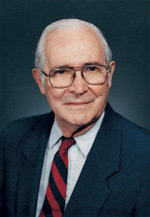REJECTION IS NOT REFUTATION
Dr. Don Kistler, founder of the Northampton Press, was born in California in 1949, the second of five sons of Jack and Faye Kistler. He grew up on a dairy farm in Central California and graduated from Azusa Pacific College in Southern California in 1971 with a double major in public speaking and religion. He holds the M. Div. and D. Min. degrees, and is an ordained minister. Prior to entering the gospel ministry, Dr. Kistler coached high school and college football for over 15 years.
Dr. Kistler pastored a local church for four years. As part of his preaching and teaching ministry, he has spoken at conferences with such notable figures as Dr. John MacArthur, Dr. R. C. Sproul, Dr. D. James Kennedy, Dr. J. I. Packer, Dr. John Gerstner, Elisabeth Elliot, Dr. Sinclair Ferguson, Dr. Michael Horton, Rev. Alistair Begg, Dr. Albert M. Mohler, the late Dr. James Boice, and Rev. Eric Alexander, to name just a few.
Dr. Kistler is the author of the book A Spectacle Unto God: The Life and Death of Christopher Love, and Why Read the Puritans Today? and is the editor of all the Soli Deo Gloria Puritan reprints. He was a contributing author for Justification by Faith ALONE!; Sola Scriptura; Trust and Obey: Obedience and the Christian; Onward, Christian Soldiers: Protestants Affirm the Church; and Feed My Sheep: A Passionate Plea for Preaching.
He has edited over 150 books. He currently resides in Orlando, FL.
(The following is a transcript I wrote, taken from Lecture 2 of a seminar on Jonathan Edwards by Dr. Don Kistler, at Saint Andrews Chapel, Sanford, Florida, September 2003.)
Dr. Don Kistler – “People will often say “I don’t agree with you” but what does that prove? So what?”
“Let me tell you how this was driven home to me by the late Dr. John Gerstner. I was his pastor for four years (and you think you have pressure on the job). We used to drive to a Bible Study and I’d gotten a question in the mail from someone about Sabbath breaking (someone who was a very strict Sabbatarian) and they asked if anyone who did not keep a very strict Sabbath could REALLY be a Christian (that was the essence of the question).
I always drove Dr. Gerstner in his car and so I asked him, “how would you respond to this question?” I realized, you don’t ask him questions. He asks the questions.
Dr. Gerstner said, “Lets suppose for the sake of the argument that you are a practicing Sabbath breaker and I am a practicing homosexual.” He says, “Are you going to heaven or to hell?”
I said, “I’m going to heaven.” 
He said, “Am I going to heaven or to hell?”
I said, “You’re going to hell.”
He said, “So you’re violating one of God’s commands and you get to go to heaven but I am violating one of God’s commands and I have to go to hell. What is it, did I pick the wrong command, Don?”
“Well,” I said, “the scripture is not as emphatic about Sabbath breaking as it is about homosexuality. Paul calls that the lowest form of degradation that there is. The Bible never calls Sabbath breaking an abomination… errr.. how’s that?”
Gerstner responded, “How’s that?… How’s what?”
I said, “my answer.”
He said, “what answer? You fumbled around and tried to throw a few verses at me. Did you think you were going to intimidate me with a couple of verses? Now do you have an answer to my question or not?”
Panting for breath I said, “well, good and godly men have disagreed over the issue of the Sabbath, you know Calvin and Luther and your man Sproul.”
He said, “ok, Calvin and Luther and Sproul and you and me will all be in hell together. Now what is your response to my question? Why is it YOU get to go to heaven and you can violate a command of God and I can’t violate a command of God but I have to go to hell. What kind of a system are you running here?”
Well I am really sweating bullets… and so we pull up to the place we are going and I ask, “what’s the answer?”
He said, “we’ll talk about it on the way home.”
“On the way home? That’s another hour!”
Well he did this all the way home and when we got there I said, “now tell me what the answer is.”
He said, “we’ll do it next month.”
“No, we’re not doing it next month. I want to sleep between now and next month.” Continue reading



